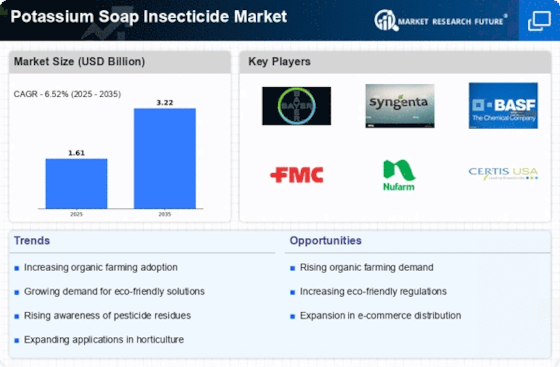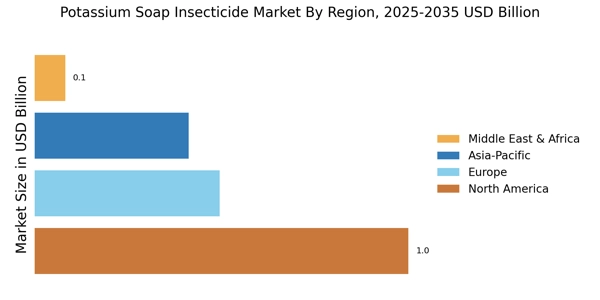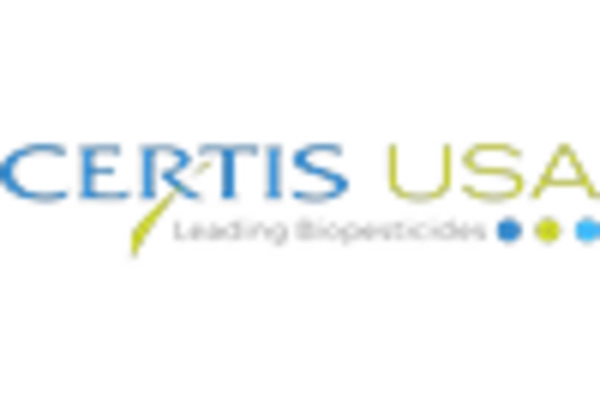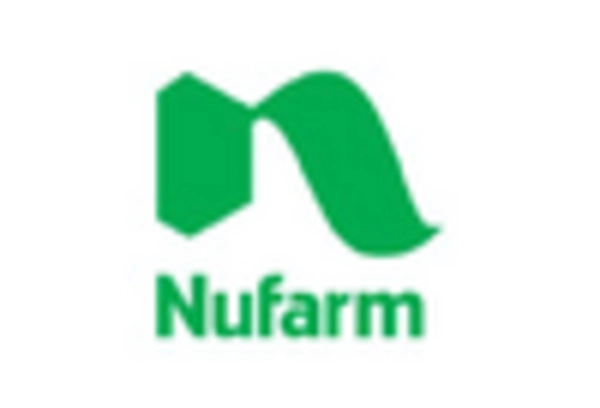Rising Demand for Organic Farming
The increasing consumer preference for organic produce is a pivotal driver for the Potassium Soap Insecticide Market. As more farmers transition to organic farming practices, the demand for natural pest control solutions rises. Potassium soap, being a biodegradable and non-toxic option, aligns well with the principles of organic agriculture. According to recent data, the organic farming sector has witnessed a growth rate of approximately 10% annually, which directly correlates with the rising adoption of potassium soap insecticides. This trend suggests that as organic farming expands, the Potassium Soap Insecticide Market is likely to experience a corresponding increase in demand, as farmers seek effective and environmentally friendly pest management solutions.
Consumer Awareness of Health and Safety
There is a growing awareness among consumers regarding the health and safety implications of chemical pesticides, which significantly influences the Potassium Soap Insecticide Market. As consumers become more informed about the potential risks associated with synthetic chemicals, they increasingly favor products that are perceived as safer for both human health and the environment. This shift in consumer behavior is prompting farmers and agricultural producers to adopt potassium soap insecticides, which are recognized for their low toxicity and minimal environmental impact. Market data indicates that the demand for safer pest control options has surged, with potassium soap insecticides emerging as a preferred choice among health-conscious consumers. This trend is likely to bolster the Potassium Soap Insecticide Market as it aligns with the broader movement towards sustainable and responsible agricultural practices.
Technological Advancements in Agriculture
Technological advancements in agricultural practices are significantly shaping the Potassium Soap Insecticide Market. Innovations such as precision agriculture and integrated pest management systems are enhancing the efficacy of pest control methods, including the use of potassium soap insecticides. These technologies enable farmers to apply insecticides more efficiently, reducing waste and improving pest control outcomes. Furthermore, the integration of data analytics and smart farming techniques allows for better monitoring of pest populations, leading to more targeted applications of potassium soap. As these technologies continue to evolve, they are likely to drive the adoption of potassium soap insecticides, as farmers seek to optimize their pest management strategies while minimizing environmental impact.
Regulatory Support for Eco-Friendly Products
Regulatory frameworks increasingly favor eco-friendly agricultural practices, which serves as a significant driver for the Potassium Soap Insecticide Market. Governments and agricultural bodies are implementing policies that promote the use of natural pest control methods, including potassium soap insecticides, as part of broader sustainability initiatives. This regulatory support not only encourages farmers to adopt safer pest management solutions but also provides incentives for research and development in this area. Market data suggests that regions with stringent regulations on chemical pesticides are witnessing a surge in the adoption of potassium soap insecticides, as farmers seek compliant and effective alternatives. This trend indicates a favorable environment for the growth of the Potassium Soap Insecticide Market, as regulatory support aligns with consumer demand for sustainable agricultural practices.
Growth of Home Gardening and Urban Agriculture
The rise of home gardening and urban agriculture is emerging as a notable driver for the Potassium Soap Insecticide Market. As more individuals engage in gardening, particularly in urban settings, the need for effective and safe pest control solutions becomes paramount. Potassium soap insecticides are particularly appealing to home gardeners due to their non-toxic nature and ease of use. Market trends indicate that the home gardening sector has expanded significantly, with many consumers seeking organic and environmentally friendly products for their gardens. This growth in urban agriculture not only reflects a shift towards self-sufficiency but also creates a burgeoning market for potassium soap insecticides, as urban gardeners increasingly prioritize sustainable pest management solutions.


















